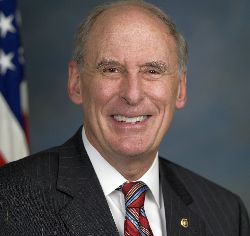 U.S. Senator Dan Coats wants tougher sanctions against Russia for its growing involvement in Ukraine, despite signs of wariness back home.
U.S. Senator Dan Coats wants tougher sanctions against Russia for its growing involvement in Ukraine, despite signs of wariness back home.
“If there is a bully in the schoolyard, the sooner you realize that and stand up to that bully, the less grief you’re going to endure,” said Coats, a member of Senate Intelligence Committee.
Coats stops short of calling for the United States to arm the Ukrainian military to combat pro-Russian forces, as some of his Republican colleagues have done. But he’s pushing for action by the United States and its European allies before civil war erupts in Ukraine.
During an interview in Indianapolis, Coats said when he returns to Washington next week, he plans to join a group of Senate Republicans who will call on the Obama administration to ratchet up sanctions against Russia’s banking and energy industries.
A former U.S. ambassador to Germany, Coats said he’s scheduled to have dinner with German Chancellor Angela Merkel and plans to push her to adopt a more hardline approach against Russia, the biggest supplier of natural gas to the European Union.
“I’m for taking tough diplomatic, economic and financial sanctions now,” he said, “so we can send a message to Russia that this is going to hurt them in the long run.”
Coats is a prominent critic of Russia’s military actions in the disputed Ukrainian territory of Crimea. In early March, he joined Democratic Senator Dick Durbin of Illinois in a resolution calling for harsh international punishment for Russian President Vladimir Putin and his government.
He followed that with legislation to prevent the United States from recognizing Russian sovereignty in Crimea. It also would prohibit U.S. investment in Crimea involving Russia, and it would oppose international assistance to Crimea via Moscow.
The Obama administration has threatened sanctions but also urged diplomatic solutions, wary of escalating tensions between Ukraine and Russia, the world’s biggest energy producing nation. On Monday, Vice President Joe Biden launched a high-profile visit to Ukraine to push for implementation of an international agreement aimed at de-escalating tensions. The same day, U.S. oil prices reached a seven-week high.
Coats said he’s keenly aware of consequences of U.S. involvement, including a possible turn in public opinion. On Monday, the national pollster Rasmussen reported that 58 percent of Americans want the United States to leave the situation alone — up from 52 percent last month.
But Coats said Ukraine’s stability is connected to the stability of Europe. A civil war there, he said, could unfold like the Balkan wars of the 1990s, which killed more than 100,000 people.
“If American foreign policy and strategic interests have any permanent core, it is interest in Europe’s well-being,” he wrote in an open letter to Hoosiers last month.
Coats is repeating that message in meetings around the state, knowing it’s a tough sell to connect tensions in Ukraine with a stable economy back home.
“What happens in Ukraine is very important to [the] world’s economy and to our economy,” he said in the interview. “That alone ought to encourage us to take steps now that will prevent a worse situation later.”
By Maureen Hayden














